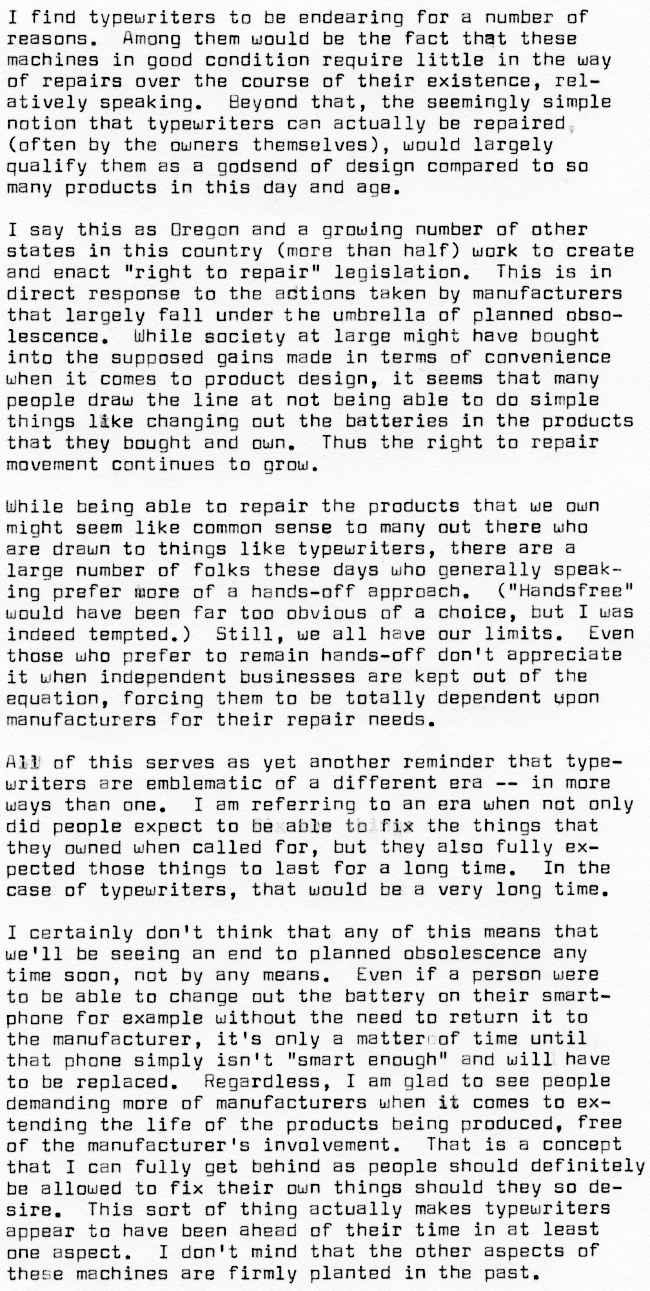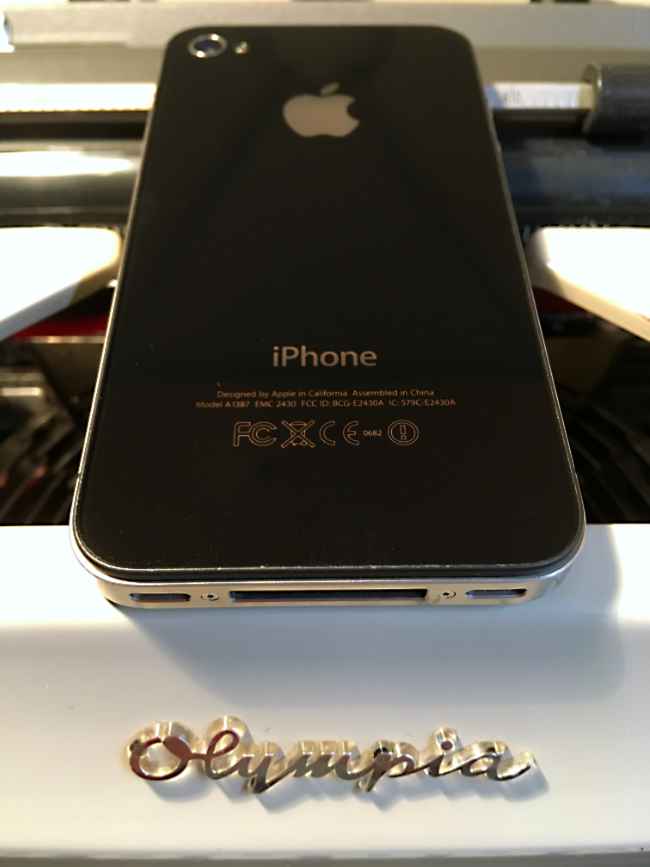
I find typewriters to be endearing for a number of reasons. Among them would be the fact that these machines in good condition require little in the way of repairs over the course of their existence, relatively speaking. Beyond that, the seemingly simple notion that typewriters can actually be repaired (often by the owners themselves), would largely qualify them as a godsend of design compared to so many products in this day and age.
I say this as Oregon and a growing number of other states in this country (more than half) work to create and enact “right to repair” legislation. This is in direct response to the actions taken by manufacturers that largely fall under the umbrella of planned obsolescence. While society at large might have bought into the supposed gains made in terms of convenience when it comes to product design, it seems that many people draw the line at not being able to do simple things like changing out the batteries in the products that they bought and own, Thus the right to repair movement continues to grow.
While being able to repair the products that we own might seem like common sense to many out there who are drawn to things like typewriters, there are a large number of folks these days who generally speaking prefer more of a hands-off approach. (“Handsfree” would have been far too obvious of a choice, but I was indeed tempted.) Still, we all have our limits. Even those who prefer to remain hands-off don’t appreciate it when independent businesses are kept out of the equation, forcing them to be totally dependent upon manufacturers for their repair needs.
All of this serves as yet another reminder that typewriters ere emblematic of a different era — in more ways than one. I am referring to an era when not only did people expect to be able to fix the things that they owned when called for, but they also fully expected those things to last for a long time. In the case of typewriters, that would be a very long time.
I certainly don’t think that any of this means that we’ll be seeing an end to planned obsolescence any time soon, not by any means. Even if a person were to be able to change out the battery on their smartphone for example without the need to return it to the manufacturer, it’s only a matter of time until that phone simply isn’t “smart enough” and will have to be replaced. Regardless, I am glad to see people demanding more of manufacturers when it comes to extending the life of the products being produced, free of the manufacturer’s involvement. That is a concept that I can fully get behind as people should definitely be allowed to fix their own things should they so desire. This sort of thing actually makes typewriters appear to have been ahead of their time in at least one aspect. I don’t mind that the other aspects of these machines are firmly planted in the past.
AFTERTHOUGHTS: I was made aware of Oregon’s efforts in the right to repair movement by Repair PDX, an organization that I’ve donated some of my time to in the past. Repair PDX puts on “Fix It Fairs” around Portland where their volunteers focus on fixing products in need of repair that are brought in by the public. While the volunteers aren’t able to fix everything that people bring in, they do have a pretty good success rate and this work is carried out free of charge.
.


True, True and again True!, what a great post, for me I think the best yet and more to come enjoyed again you’re great blog. Thnx.
Indro
Indro, you are a great encouragement and I truly appreciate it. I’m really glad to know that you are enjoying the content thus far. Hopefully you’ll continue to give consideration to starting a blog of your own — I would be among the first to check it out were you to do so. (You could kick things off by writing about your new Ambassador!)
Yes, I have a domain and looking for the possibilities!
Also thnx for taking time to reply (to everybody), a thing you do not see on most blogs..
Greetings,
Indro
The real question is, how do you not make a single typo?! Haha! My blog looks a bit messy by comparison. My dad, at 85, struggles to understand our throw away society. He thinks everything should be high quality, meant to last for decades. I remember the days before our wasteful ways, but I understand the need to manufacture at the lowest cost to broaden the potential market. Great post! Keep it up.
The answer is KO-REC-TYPE, lol. If you look closely enough you’ll find evidence that my typing is far from perfect. While I would love it if manufacturers shared your dad’s philosophy, your take on things is more realistic.
Even though it had been around since the 1960’s, surface mount technology wasn’t widely adapted until the 1980’s. I was still involved in engineering at the time and can remember the buzz that this generated on the manufacturing side of the equation given the many benefits that it brought. Yet it surely wasn’t so well received by those involved with repairing electronics circuitry, and for good reason. That’s something that I likely wouldn’t have thought much about at the time. The difference these days is that manufacturers are now actually intentionally engineering repair prevention into their products. That’s taking planned obsolescence a step too far as far as most are concerned.
Apple’s whole philosophy (at least since Jobs supplanted Woz’s influence) kept me from being a part of the Apple ecosystem after the IIe days. If I can’t fix it or repurpose it, I ain’t buying it. (:
I initially became hooked on Apple products thanks to the Macintosh (with its GUI courtesy of Xerox). Given my general disregard for electronics, I never gave much thought to opening the things up if need be. To be fair, rarely did the issue arise for me with their older products (I actually still have a Mac Classic tucked away somewhere that was still working last I knew). As I’ve aged and grown wiser (I seem to be much more successful at the former rather than the later), I eventually came around to understanding why those such as yourself feel the way you do. What is the saying? The older I get, the less I know.
The irony is that I studied electrical engineering in college because I couldn’t hack the chemistry of metallurgy required for mechanical engineering. Talk about a square peg in a round hole. I persevered long enough to obtain my degree, but weeded myself out of a telecom engineering gig within five years. While I’ve always enjoyed turning wrenches, I had no desire to work with electronics in my own spare time (the reality is, I was completely void of competency in this regard).
Funny! I’m the opposite: Chemistry came naturally to me, but physics (including the applied physics of circuitry) proved to be my undoing.
As for Apple, I preferred the software so intensely (and still do, although Apple software has degraded significantly and Windows has got hugely better) that the limited tinkering factor never bothered me. Before the introduction of OS X, you could “tinker” with the software to your heart’s content, modifying any menu, button, or message in almost any program with a little app called ResEdit (because it let you modify the “resource fork” with a mostly GUI interface). I loved that.
It is funny because I actually enjoyed chemistry in High School, but there was no love lost for it by the time I had made my way to college.
But have you ever spent $10 repairing something that cost $12?
Knowing me, I have no doubt, lol.